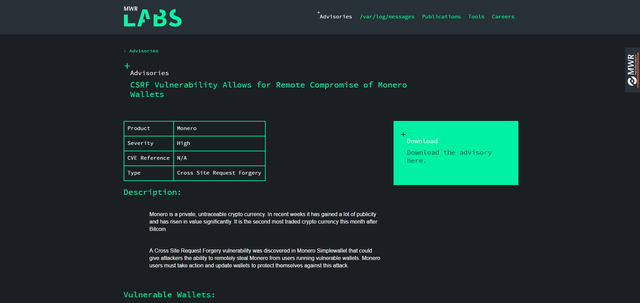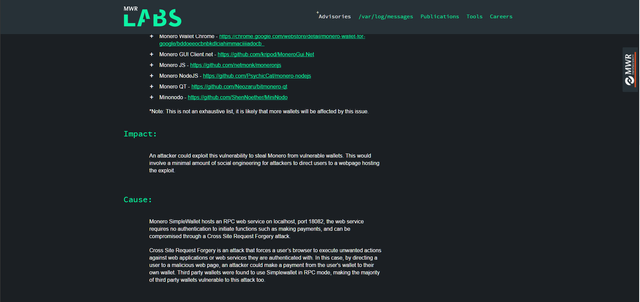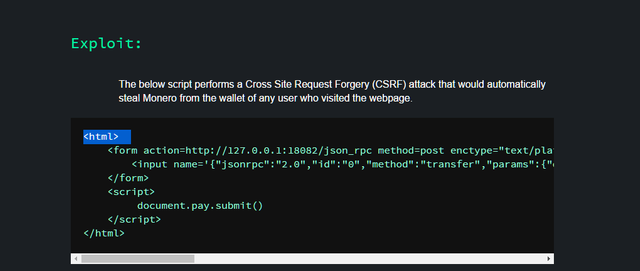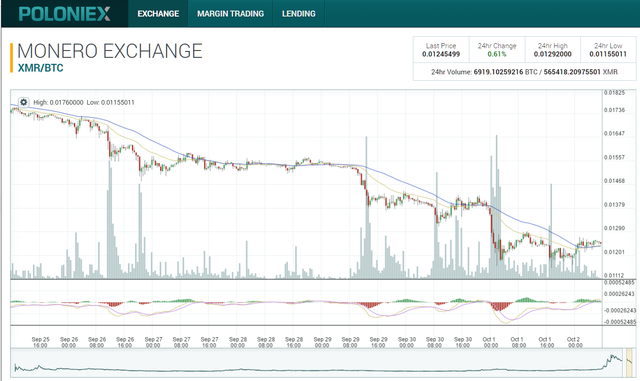MWR Labs XMR Monero Advisory - Statement From The Monero Core Team
Towards the end of last month, MWR labs discovered an RPC bug that would enable a hacker to have access to a third-party wallet like exchanges for example. However, It has been a known issue and is disclosed in their statement.
This is the MWR advisory on their page:
Screenshots:


They even posted the script that performs a Cross Site Request Forgery (CSRF) attack that would automatically steal Monero from the wallet of any user who visited the webpage:

The statement from the Monero core team:
There seem to be some misconceptions and even outrightly false statements being made around the unauthenticated RPC "bug" that was "discovered" by MWR Labs, and we'd like to make certain facts of the matter clear.
First off, it's important to remember that Monero is an unfunded open-source project, and the project only moves as fast as the unpaid volunteers that put their time and effort in. The Monero Core team act as stewards of the project, but we cannot represent every possible developer or contributor, and we certainly can't represent every user. Thus, this statement is from our position and ours alone.
MWR Labs did indeed contact us and responsibly disclose the CSRF attack. This was not an unknown issue to the community - see, for instance, this StackExchange comment: http://monero.stackexchange.com/a/777/47, and this was also highlighted by Juliano Rizzo from Coinspect in 2014.
In truth, RPC authentication has taken something of a back seat, as we have been working on replacing the RPC layer with 0MQ, which has support for both encryption and authentication. The RPC interface will live on in an independent stub, and will gain authentication and TLS support when someone is willing and able to work on that. In addition, the official Monero GUI doesn't use the RPC layer, and directly implements the libwallet_api for all its wallet functions.
The unauthenticated RPC has proven useful, though, as it is the only way for exchanges, mining pools, and integrators to integrate Monero. Exchanges, pools, and integrators are not at risk with this CSRF attack, as it is unthinkable that a custodial service would host a hot wallet on a computer that has a browser - these are extremely sensitive systems and the hot wallet would be hosted in an extremely well-defended environment, with most of the funds in an off-site cold wallet, lest all the deposited funds get stolen.
Thus, libraries such as MoneroNJS and Monero NodeJS cannot be said to be "vulnerable" to this, because they are libraries that are used by integrators and not by any software that would run on a machine with a browser in the background. No automated system that has a hot wallet should ever run in such an insecure environment, and developers are keenly aware of this. Statements from MWR Labs claiming that those libraries are vulnerable are technically true, in a sense, but that observation is like saying that all Monero wallets are at risk if you use "password" as your password and also post your wallet file on Dropbox and share the link on Reddit - technically true, but a largely useless observation.
Similarly, MWR Lab's claims of certain wallets being vulnerable is equally useless. MoneroGui.Net, for instance, has a huge note on the README highlighting that the project is discontinued. The same goes for bitmonero-qt and MiniNodo, both of which are unmaintained. All of these wallets wouldn't even work with the current version of Monero, so they're technically vulnerable, but it's not even possible for anyone to use them.
The only two wallets in MWR Lab's list that are actually vulnerable, and are actually in use, are bigreddmachine's Google Chrome wallet, and jwinterm's lightWallet2. In response to the disclosure, we added a quick patch to provide a way for both of these wallets to prevent the attack. They, in turn, patched their clients accordingly.
We did not enable the functionality by default for several reasons:If we'd provided a flag to disable the functionality it would create a false sense of security if one of the actively developed wallets decided to just pass that flag as a quick "fix".It would have broken all the mining pools, and since the mining pool software is largely fragmented and not centrally maintained there is a great chance that pool operators would have struggled to add support of their own accord (unless we added a disable flag, which just leads to point number 1)It would have broken all integrators and merchants, and they would have to code in a subsystem that is going to fall away within a few months once we've had a chance to re-address the RPC authentication matter.
It is important to note that this is not a flaw in Monero, or in the implementation, or in the cryptography. This is not even something that you could encounter simply by using monero-wallet-cli. You would have to be actively using monero-wallet-cli in RPC mode, on a particularly vulnerable machine, and then click on a malicious link on a website using a browser on that same computer.
Not only is this patched, but the two actively-developed clients that were actually affected by it have been patched, and this was all done in a way that is not disruptive to existing server-side software.
More importantly, since monero-wallet-cli does not enable RPC mode by default, there is nothing that is vulnerable in it unless the user actively enables a setting that allows for someone to remotely control the wallet.
We trust that MWR Labs will note this in their advisory, and adjust it accordingly.
- The Monero Core TeamMWR labs did update the notice and said researcher Joseph Redfern reported the patch for the vulnerability is disabled by default. Users are supposedly still vulnerable and MWR suggests enabling the patch by adding the "--user-agent" argument like so:
./monero-wallet-cli --rpc-bind-port 18082 --rpc-bind-ip 127.0.0.1 --user-agent 123456randomstring
Anytime there is news of a vulnerability in the crypto world, the price will drop. Is it time to get rid of your supply? Or will it turn out something like the Ethereum/DAO prices recovering?From what I read I don't think it's much of a vulnerability since a hard fork would not be involved, but will it stand up against the rest when there are upcoming competitors?
XMR Monero seems to be on the decline this week since the news. Where do you see your trades headed?
Screenshot:

Source: MWR Labs
Source: Monero Core Team
Update:
The preview showed the script earlier for the have put I just posted a screenshot to make it easier and check out the site :P
Feel free to follow and find me in Smart Media Group on Discord.

 Facebook: @thesmartmediaproject
Facebook: @thesmartmediaproject Twitter: @the_smartmedia
Twitter: @the_smartmedia
 Instagram: @the_smartmedia
Instagram: @the_smartmedia
.gif)

I believe Monero will recover this price decline.
What makes you say that?
I say it with experience.
Its server level exploit i don't think recovery would be easy
could you elaborate a little more on it?